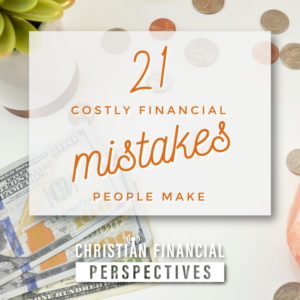Click below to listen to Episode 96 – 21 Costly Financial Mistakes People Make
Subscribe: Apple Podcasts | Google Podcasts | Spotify | Amazon Music | Stitcher | RSS | More
21 Costly Financial Mistakes People Make
Unfortunately, many of us have fallen prey to common financial mistakes, but it doesn’t have to be that way. As Proverbs 21:5 says, “The plans of the diligent lead to profit as surely as haste leads to poverty.” There are so many that are easily avoidable if you know what to look for. This episode breaks down 21 of the most common financial mistakes that Bob has seen people make over and over again during his 30 years in the financial business.
Even though 21 financial mistakes may seem like a lot, this is actually just the tip of the iceberg. We really want our listeners to have a heads up and better understanding of their finances and why these mistakes can cost people so much in the long run. A few of the common financial mistakes that are discussed in this episode include buying a brand new car; paying too high of an interest rate; buying low quality in order to “save” money; not having a will; and not budgeting.
HOSTED BY: Bob Barber, CWS®, CKA®
CO-HOST: Bailey Theaker
Mentioned In This Episode
Want to ask a question about your specific situation? Schedule a complimentary 15 minute phone call.
EPISODE TRANSCRIPT
[INTRODUCTION]
Welcome to “Christian Financial Perspectives”, where you’re invited to gain insight, wisdom and knowledge about how Christians integrate their faith, life and finances with a Biblical Worldview. Here’s your host Christian Investment Advisor, Financial Planner, and Coach, Bob Barber.
[EPISODE]
Bob:
Welcome to the 96th podcast. We’re getting close. Close to that 100. So today we’re gonna be talking about 21 financial mistakes that people make, and I don’t want you to make them, but I’ve made some of them and I’m certain you have as well. I’ve served in financial industry now for over 30 years. That’s what all this gray hair is you see is about now. And I’ve seen a lot of these things happen that we’re going to share today and essentially we’re kind of doing 21. We might have more, but we’ve got to consolidate it because it’s 2021, and we’ve done 21 goals and 21 things to stay away from. 21 is kind of the big number this year. I really want to help guide our podcast listeners in making wise financial decisions and staying away from the stupid ones.
Bailey:
Amen to that. I’m all for hearing those. Well, like always, we’re gonna kick off with a scripture and this one comes from Luke 14:28-30 and it says, “Suppose one of you wants to build a tower. Won’t you first sit down and estimate the cost to see if you have enough money to complete it? If you lay down the foundation and are not able to finish it, everyone who sees it will ridicule you saying this person began to build and wasn’t able to finish.” Bob, I know you’ve been a part of a group called the Kingdom Advisors for a long time now, and they teach that there are four ways to spend money. You live, give, owe, or grow. Can you tell us a little bit more about that?
Bob:
Yeah, it’s really simple. I remember Ron Blue came up with this, who is the founder of Kingdom Advisors. By the way, I wanted to say, thanks for picking up scripture, too. That is a really great scripture. When I was putting this together, I didn’t have that scripture mind, and I saw you put the scripture up there. I’m glad you did. It’s a great one. When you look at money, there’s only four ways you can spend it. What you’re living on, what you owe, what you’re giving, and what you’re putting aside to grow. We call it live, give, owe, grow. And it’s really a simple way of looking at money. I’ve had an entire podcast on just this subject – live, give, owe, grow, and breaking down those four areas. And in the OWE area you’re always going to owe taxes. So that’s something we’re never going to get rid of, but it also has to do with debt. We’re gonna talk a little bit about that today in those 21 financial mistakes, but you also think that live, give, owe, grow, think of it like a pie chart. If you divide that into four pieces, if you’re living on too much, it’s going to make one of the other pieces smaller, right? Or if you live and you owe too much, then your giving is going to suffer. So the way that you increase any of those areas is by doing less in the other areas. But I don’t wanna see that happen with giving because giving, as we know, releases the bondage of selfishness that we have in our lives. We just had a podcast on giving that I think is so good. If you haven’t heard it, as our podcast listeners, go back and listen to that. Giving is all about, like I say, releasing the selfishness and then sending on ahead to the kingdom and eternal value.
Bailey:
That’s so good. Great. Well, with all of that in mind, let’s get into our list of 21 financial mistakes that people often make. Bob, what is the first thing on our list?
Bob:
Here we go, 21. It’s like a lot, isn’t it? The first one I’ve seen so many times is that people make quick decisions without knowing all the costs that are involved in those decisions. Like buying something too quickly, maybe buying that vacation home. I’m guilty, I’ll tell you, I’ve made a lot of these, but I’ve learned. Maybe you’re buying a new car without thinking about it. And I always think I’ve learned now, as an old guy, it’s best to wait two or three days, maybe even two or three weeks or two or three months, before you make large buying decisions, purchasing decisions. And I think you need to think really deeply about them and pray about them because as a Christian, financial decisions should be a spiritual decision as well. And I know I’m old fashioned here. I think it’s good to take a piece of paper and write down what are the advantages of buying that new car or buying a second home or whatever you’re gonna be doing that’s a large purchase. What are the advantages of that? And what are the disadvantages of it? And even small purchases, small purchases can really, really add up if you’re not careful. And today, you have these apps on your phone, walmart.com or amazon.com or whatever those apps are, you can just buy without even really thinking about it. It’s boom, boom, boom. And before you know it, that adds up too, so hold off on those decisions. Now food, you need food. I’m not ever saying to hold off on that or medicines, but maybe that brand new outfit that could cost $300 or that purse. It’s better to wait. Say, what are the advantages of this?
Bailey:
I know that my husband and I, we can often point the finger at each other for spending more money, but he’s more likely to spend money on the big things. So he’ll buy a new guitar for thousands of dollars. And I spent a lot of little bitty things like on Amazon. I’m constantly buying books and I’m spending $10 and $10 and $10 on books. So we’ll look at each other. He’ll say you spend all the money and I’ll say, no, you spend all the money, but he did it all at once. I just did it in little bitty pieces all throughout the month.
Bob:
I’m going to tell you right now, guys are famous for that. Well spend the money on the big new truck or the boat, or maybe the RV. Yeah. And then we will get upset with our wives when they’ll spend a little money, but those little pieces never add up to what that cost. I’m sorry, guys.
Bailey:
Well, we’ve made the rule that he has to wait like a month before he makes a big purchase and we decide together, but I do the same thing with smaller purchases. I’ll put in the cart and I’ll wait. I’ll wait a week or two, and then I’ll buy the book if I really want it later. So what’s number two on our list?
Bob:
This is interesting one, but I’ve been guilty of this myself is allowing tax consequences to dictate large financial decisions. We all hate paying taxes. I mean, I’ll meet people, my tax burden is way up there, over six figures, because I’ve been in business 37 years. I have to pay that, but people still complain that their taxes are $2,000, and I’ve seen people make decisions strictly based on what the tax consequences are. As an example, investments, I seen people that were over concentrated in one investment. I had a client many, many years ago have an enormous amount of money in just one major company. I can’t say what the major company is because that might be a recommendation to buy or sell, but it was a well known company that’s been around in America for 70 plus years. This was inherited stock from her dad, and I’m talking in the millions of dollars. So she was all concentrated in this one stock. And I tried to get her to diversify out of that, but she said, well, I have to pay all these taxes. I could see the handwriting on the wall that this was a company, and it’s an older company now, and the stock has dropped. I mean, it has dropped 80%, but she didn’t want to diversify because of the tax consequences. Yet diversification is all in God’s word. Ecclesiastes 11:2, “Divide your portions to seven or eight, because you do not know what disaster may come upon you.” So don’t make those large financial decisions strictly based on taxes, but it needs to be on wisdom too. The third one I see is people buying a new home or upsizing without counting all the costs. When you go into a new home, or an older new home, but when you buy another home, you’ve got to be thinking about the maintenance and repairs and the insurance and the taxes and utilities that are associated with buying that new home. Many times, it might be better just to stay put for a while and continue renting, even though the media has us convinced that you should all buy a home, but that’s not necessarily always the case.
Bailey:
Well, speaking of making those big purchases, what about buying a vehicle or a toy?
Bob:
I started touching on that awhile ago a little bit. Buying new cars too often is a major, costly financial mistake I see people make. I mean new cars depreciate by as much as 50% in the first three years. Not all cars, but pretty much 90% of them do. So I always ask somebody, would you repeatedly invest in a mutual fund or put money in a savings account knowing that for sure it was gonna be worth 50% less in three years every single time you invested in it? Should you do that? But many people switch out cars every two or three years, right as the depreciation is starting to level out. So it’s that first year and second year and third year. By the third year, it’s best to buy a car that’s about three years old. It’s still in good shape, and you can find one that’s still got low miles. Let somebody else lose all that money instead of yourself.
Bailey:
Sure. That makes total sense. What about big toys like boats and RV’s and things like that?
Bob:
You know what I’ve seen so many times? That’s another major mistake and they’ll buy these toys like boats or an RV, maybe a four wheeler or a motorcycle. And heck, I want you to have fun. Life is not all about work. But they’ll make these kinds of purchases before they have six to nine months of cash reserves and savings for emergencies or before paying off all their debts, before having a systematic savings plan, an investment plan for retirement. So that’s a huge mistake. You need to have those things in place first before you go buy those toys, which by the way, it’s going to go down 50% value also in the first three years, or maybe more.
Bailey:
I can attest to that. We bought a motorcycle about four years ago and we can’t even sell it for half of what it’s worth.
Bob:
And we’ve had some clients buy RV’s, and I’m telling you, you could travel the United States and stay in every Four Seasons and Ritz Carlton and JW Marriott in the United States and you’ll never get up to what an RV is gonna cost in just the gas alone. And then you’ve gotta pay rent and all the insurance and the hassle. I’ve heard a lot clients that have gone down that road and wish they hadn’t had.
Bailey:
Oh, I didn’t even realize how risky those kinds of purchases could be for people. They sound like fun, right? You don’t think about the risks.
Bob:
I’ve owned a couple of boats and you were asking me about that and you said, you have a new place in Rockport. Are you going to get another boat? And what did I say?
Bailey:
No. Because you’re going to make some friends who have boats.
Bob:
Exactly. They pay the insurance. I have friends that have boats, and when they wanna go out, I’ll say, hey, can I go out with you the next time you’re going out?
Bailey:
That’s wisdom right there. Okay. Well, let’s talk about borrowing money. What are your thoughts on credit cards and debt?
Bob:
Well a lot of people, they’re gonna be surprised at me saying this, but using a credit card instead of cash – and even if you pay it off every single month, which a lot of people do that they say, well, I’m using it to get all the points – what the studies have shown over and over and you can verify this with Dave Ramsey, that when you are using a credit card to pay bills with that on average, you’re gonna spend between 10% and 15% more per month or annually. Now I want you to think about that. Over the months and the years, you’re spending between 10% and 15% more, even if you’re paying off a credit card, every single month. So it’s costing you a lot more than all those points or airline miles that you’re getting.
Bailey:
Wow. I didn’t think about that. What about number seven?
Bob:
Number seven is taking on too much debt. And our financial institutions, they love you to take on that debt because then you become a slave to them, right? It says that in scripture, but the general rule of thumb, according to financial institutions, is you’ll have a debt up to about 50%. The experts, I guess I’m an expert now because I’ve been doing this for so long, as a general rule of thumb is you should not have more than 30% of your monthly income going to debt payments, and that’s including your mortgage. So take your mortgage. If you have a car payment or two, whatever other debts you may have, and it shouldn’t add up to more than 30%. That leaves you room for living and all the rest of life’s essentials, for giving, and for saving for your future.
Bailey:
Well something I never even think about when I’m looking at that is the interest rate. It feels like it always sneaks up on me after I have a credit card or take out a loan on something. Oh yeah, this isn’t just the loan. So what about interest rates?
Bob:
That’s definitely a big one, paying too high an interest rate on debt that you do have. I’m still seeing people that they haven’t refinanced their home in talking to them. They’ve got a rate of 4%, and they need to refinance now before rates go up, because they’re about to go up. If it’s a 30 year mortgage and you have 25 years left on it, move it down to 15 years or 12 years because you can get a rate that’s about half of that today. And that kind of plays into my next mistake, which is mistake number 9 of the 21 mistakes is not paying all your monthly obligations always on time. And what that does is that hurts your credit score, and your credit score determines that interest rate. So number nine kind of points back to number eight about paying the higher interest.
Bailey:
That’s good. Can you tell us a little bit about the mistakes that people often make when it comes to budgeting, or not budgeting, and saving?
Bob:
Well, yes, definitely. And this will be number 10 of our 21 when it comes to that budgeting and saving and spending everything you make. So you need to learn to live below your income, not above it, and also procrastinating. That’s number 11. Procrastinating to start saving because a convenient time to save is never going to come. Everybody thinks I can do that tomorrow, but that’s a huge mistake. It’s one of the number one reasons for financial failure. I’ve done an entire podcast on that, procrastination. Remember we did the rule of 72’s. We did that about 10 podcasts ago and how money compounds and it doubles on itself, and every month that you procrastinate to start saving is costing you down the line of what your money’s going to grow to. So spending everything you make is number 10. Procrastinating to start saving is number 11. And number 12 is having a lack of cash reserves for emergencies, because that kind of goes into that number 10. If you’re spending everything you have, you’re not putting aside cash reserves and you need cash reserves for emergencies, especially over the last year with the coronavirus because people have lost their jobs. People got ill and you need cash reserves for illness, or when things break, like if you own a home and your heating and air conditioning breaks, and you’re in your home, I’ve seen these heating and air units cost as much as $15,000. You need those cash reserves for that. If you don’t have those cash reserves and you’re spending everything you make, what’s going to happen when your air conditioning breaks in the middle of August? You’re gonna get it fixed, right? What are you going to do to get it fixed? You’re gonna go into debt. It spins. It goes into a circle. So you’ve got to learn to live on much less than you make. That mistake is not making that budget and not choosing a set amount to live on no matter what you make. And so Rachael and I, we’ve we set our income at a certain amount per month no matter what I make. I know a lot of our podcast listeners get bonuses, and their income goes up. But as the income goes up, instead of going up with that income, like we have done, we’re living on the same monthly amount today that we were living on 10 years ago. But my income is much higher, but we’ve learned to live on the same exact amount coming in every single month. There’s an old saying that I’ve heard at Kingdom Advisors to ask yourself, “How much is enough?” And it’s always just a little bit more. Learn to set up that budget. We were speaking with a couple just yesterday and one of them is about to graduate and become a doctor. So their income’s going to go way, way up, she’s about to get a very good paying job. But they’re used to living on this $40-50,000 or $70,000 a year, and now their income’s going to go to maybe $200,000 plus. Well, if you’ve been used to living on 70k, maybe raise your income a little bit. You need to congratulate yourself for all that work, but you don’t need to go from living on 70k to living on 200k or living on beyond that. So that way, you’re saving and building those cash reserves.
Bailey:
That’s so good. What are some of the things on the list that you feel like would be totally unexpected to our listeners that maybe they haven’t even thought about?
Bob:
Well, number 14 on our costly financial mistakes that people make and I see this a lot is buying low quality things that will cost you more in the long run like a cheaply made car or a cheaply built home, like a track home. You gotta be careful of that. I’ve seen many clients over the years. They’ve told me they bought a cookie cutter home and what’s happening is the builder is building the same home four years later, a mile away or two miles away, and selling it for the same price because it’s built with inferior products just to sell that home cheap. The paint is starting to come off or fade, and things are starting to happen with that home. They gravitate towards that newer looking home, but maybe if you had bought an older home and fixed it up, that was built the old fashioned way and slowly, that would not be happening. So I see things like that. Even appliances. Don’t always go for the cheapest appliance. Nowadays, appliances break, though. Buy the warranty that goes with it because they just wear out so much faster. They’re not built like they used to be.
Bailey:
Totally, totally. What’s number 15?
Bob:
This is out of nowhere, right? Not putting down roots in your community is a major financial mistake I see people make, like roots in your job and your location. There’s a book that came out many years ago called the “Millionaire Next Door”. And if you go and you read that book, and I would highly recommend everyone read that book, you’ll notice that nearly all of the millionaire next door people are people you would never suspect are millionaires. They didn’t move around chasing fantasies. They didn’t always think the grass was greener on the other side. They put down roots, and they had a strong stable foundation. Roots in one town, one job, one spouse. I’ve just seen that financial mistake when you don’t follow that, it really costs you in the long run having that mentality that the grass is always greener on the other side. That was actually number 16.
Bailey:
Yeah. But what about wise counsel? What mistakes have you seen people make as far as not seeking any counsel?
Bob:
Well, this is one of the big ones as we get near the end of our 21 is it’s not seeking God’s word and praying about all large financial decisions. Proverbs 2:6-8 says, “The Lord gives wisdom, and from his mouth comes knowledge and understanding. He holds success.” I like that word, “In store for the upright. He is a shield to those whose walk is blameless, for he guards the course of the just and protects the way of the faithful ones.” You notice some words in here? You’ve got success. He has a shield. He guards you. He takes care of you, protects you. This is why we need to focus on God’s word because it’s going to protect us. When it comes to those financial decisions, it’s a huge mistake for a Christian to move into any large financial decision without praying about it and seeking what God’s word says. In the next one, number 18, is not seeking wise advice from experienced counsel. A lot of folks have made bad decisions, but they’ve learned from those bad decisions. Look for those that have been successful. Don’t seek advice from the buzzards. Seek advice from the eagles. I mean, if I’m looking down at a hole at somebody and they’re stuck down in the hole and they were hiking somewhere and they messed up, I don’t want to get advice from them, but maybe I do, they’ll say, hey, go around, go around this. So, look for that wise counsel and look for someone that has those virtues that are found in 1 Timothy 3, which are virtues of an elder and deacon with a good reputation and well known in the community and married to one spouse and just known for their honesty and integrity doesn’t get angered easily. Just somebody that is calm and cool and collected and has a good foundation, kind of going back up to that top one. It’s really good to seek advice from wise counsel. And you’ll be surprised at wise counsel, many times they’ll say, don’t do that even though you wanted to do that. It’s a warning.
Bailey:
That’s good. Yeah. Well, I know that these last couple points talk a lot about some things that people often either forget to do or put off, put off towards later in life. And so what are these final three points in our list of 21 mistakes?
Bob:
Well, number 19, 20, and 21, number 19 is lack of insurance or buying it only on price. Please don’t buy insurance just based on price. That is very foolish. You need to buy insurance based on coverage and the protection it’s going to give you. We have a future podcast we’re going to be doing with Ron First from Christian Insurance Services and we’re gonna be calling it insurance do’s and don’t’s. That’s one of the things. Forgetting to buy that life insurance program or life insurance, like for the breadwinner, disability, health insurance, auto insurance, making sure your auto insurance has the coverages it needs. I would like to recommend that you choose an independent insurance agent, not a captive one where that’s the only company that they can sell. That company is gonna be pushing them to sell that. So that’s one of the things that I see people forget about is that one. Number 20 is not having a will. So if they died prematurely, that could be a disaster. Not having a power of attorney and a medical power of attorney if they were to go into the hospital. Do you have a living will or letting someone know if you want them to keep you alive on the machine or not if you became incapacitated. That’s the importance of a power of attorney and having someone that you know can make those wise decisions for you if you were incapacitated. And then the last one of our 21 today, that’s totally different too, of things that people don’t think about is investments and lack of diversification or over concentration in one investment. Don’t fall in love with a stock or a company just because that was your grandpa’s company that he worked for for many years, or maybe that was your dad’s or even your husband’s, who’s now passed. Don’t hold onto that stock just for that reason. And a way to measure that, a lot of people, they start to think they’re related to their stock. Call the company and see if they know who you are. Okay. So your investment is not related to you if it’s a publicly traded stock, unless you actually have large, large ownership in the company. Diversification is so important. And I’d like to sum up all 21 of these with Proverbs 21. There’s a great scripture in Proverbs 21:5 that says, “T”he plans of the diligent lead to profit as surely as haste leads to poverty.
Bailey:
Well, there you have it. That’s 21 financial mistakes that people make and that you can now avoid. As always, we’re here to help. If you have any questions, you can just call us at our office. The number is (830) 609-6986 or you can find us on the web christianfinancialadvisors.com.
[CONCLUSION]
That’s all for now.
We invite you to listen to all of our past episodes covering many financial topics from a Christian Perspective. To make sure you don’t miss any of Bob’s upcoming episodes you can subscribe to Christian Financial Perspectives on iTunes, Google Play Music, Spotify, or Stitcher. To learn more about integrating your faith with your finances, visit ciswealth.com or call 830-609-6986.
[DISCLOSURES]
Investment advisory services offered through Christian Investment Advisors Inc dba Christian Financial Advisors, a registered investment advisor registered with the SEC. Registration as an investment advisor does not imply a certain level of skill or training. Comments from today’s show are for informational purposes only and not to be considered investment advice or recommendations to buy or sell any company that may have been mentioned or discussed. The opinions expressed are solely those of the hosts, Bob Barber and Shawn Peters, and their guests. Bob and Shawn do not provide tax advice and encourage you to seek guidance from a tax professional. While Christian Financial Advisors believes the information to be accurate and reliable, we do not claim or have responsibility for its completeness, accuracy, or reliability.













